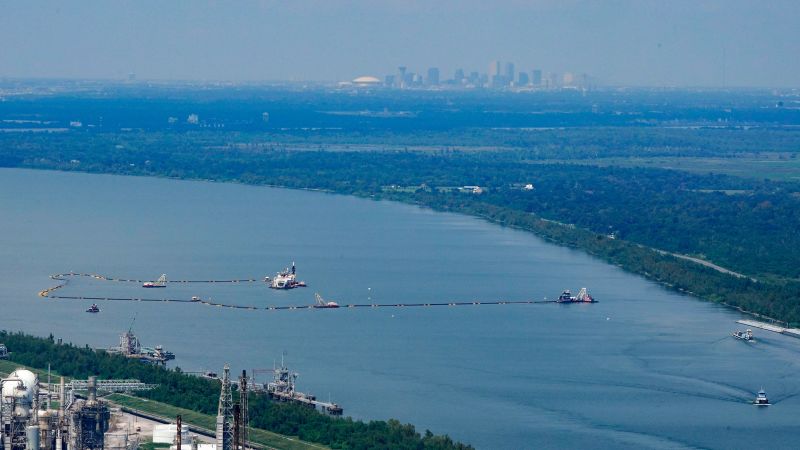Water barges and salt-filtering reverse osmosis units will not be enough to prevent saltwater from contaminating New Orleans’ largest water facility, officials said at city council meeting on Wednesday. Instead, a pipeline will be needed to deliver freshwater from upstream — not just for New Orleans, but likely for neighboring Jefferson Parish, too.
It would be a significant and pricey escalation in the region’s response to the saltwater wedge inching its way up the Mississippi River and contaminating drinking water for thousands of people.
“Barring the rain that’s probably not going to happen … the tactic or strategy we’re taking right now is drawing water further upriver,” Collin Arnold, director of homeland security and emergency preparedness for the city of New Orleans, told New Orleans City Council members.
Midwest water to ocean water: ope, just gonna squeeze past ya here.
It's almost as if humans should vacate parts of Earth where it would take a monumental amount of resources to mold the environment just to survive.
New Orleans should be abandoned for many reasons. This is just the latest. Ideally the government would have resettled people after Katrina and declared everywhere that flooded to be unbuildable.
The Mississippi is drying up. This won't help.
The flow rate is low due to short term drought in the Mississippi basin, it's not "drying up." Adequate rains will return, likely within the next month as the fall wet season gets started
Yeah I am going to disagree here.
The output of the river is 120000 cubic feet a second. This isn't California. There is still plenty of water in the river. This isn't even the Lowest recorded flow. Plus 30% of the flow goes down the atchafalaya river.
There is nothing to disagree you are wrong.
atchafalaya river
Ah so we're just making up rivers now…
Pretty shit thing to make fun of how stuff is named

I was guessing it’s an aboriginal name, so I looked it up: https://en.m.wikipedia.org/wiki/Atchafalaya_River
Yes. With a small amount of something European colonists mastered: vocal dyslexia
Ha! I've been accused of making up the names of stuff in Louisiana too. Natchitoches and Atchafalaya are always at the top.
It's a joke cupcake.
How do you disagree?
What I'm saying is this will not be a perpetual problem, but it will definitely be a more common occurrence. Periods of drought are growing more intense, as are periods of flooding. Saying the Mississippi "is drying up" makes it sound like the river is going away, but we can definitely expect a flood cycle at some point, probably in the near future
The extended periods of drought could very well cause the river to dry up. We just don’t know. i do know that in my part of the southeast, we have definitely seen a decrease in rainfall. Will the trend continue? Who knows. Climate change is going to redefine our regions.
I'm sorry, but you're the one making the fantastical claim here. The Mississippi is fed from waters that cover a third of the United States. Yes, climate change will change our ecosystems, but there's no evidence that the Mississippi will dry up anytime soon or at all.
Yes, all of the Mississippi watershed may just dry up. We just don't know!
You are confusing weather and climate bruh.
Which is fine, because one is the sum of the other, but they do have very different properties.
Expect Mississippi River dry ups to happen more often. But also for flooding to happen more often. This dry up isn't an anomaly, but dry ups happening 3x more often is.





